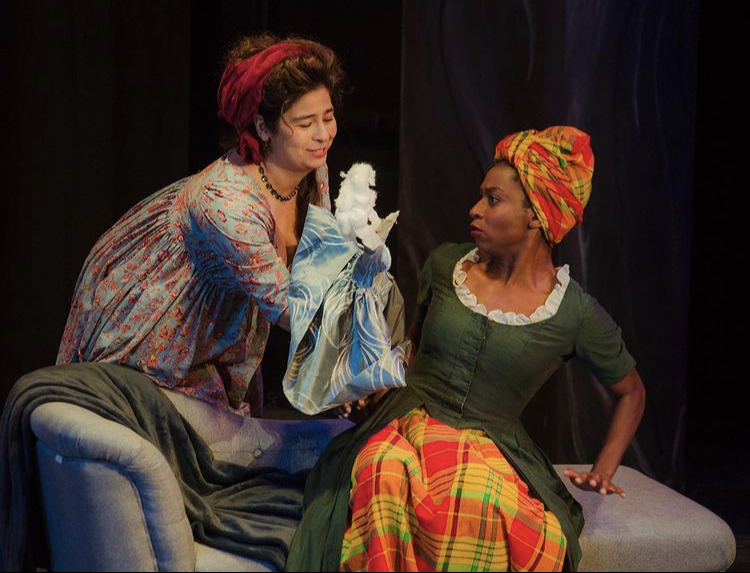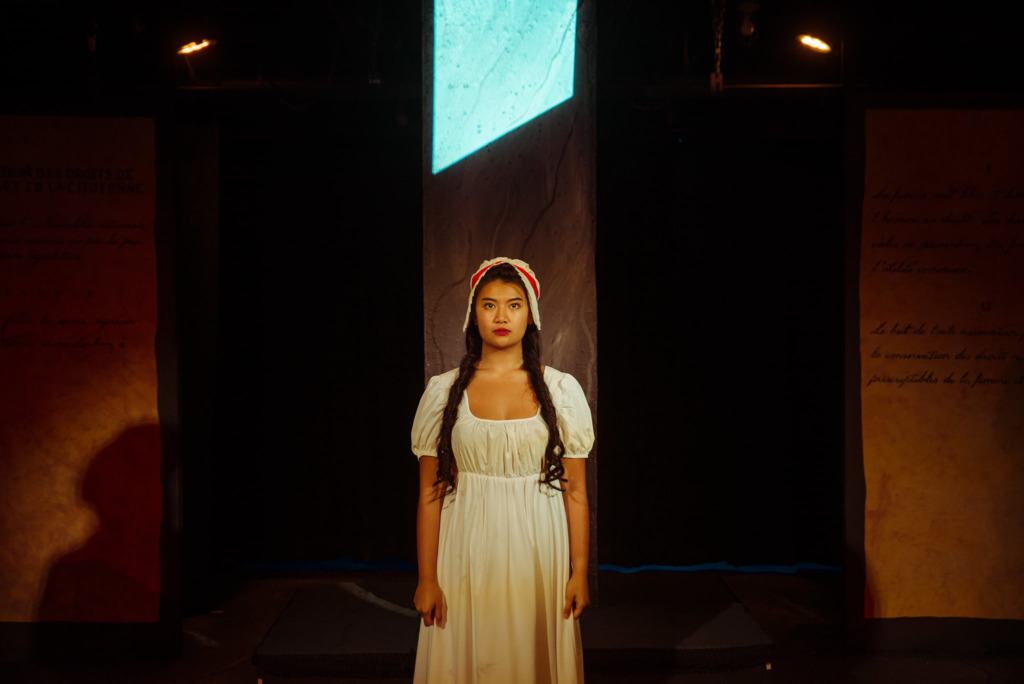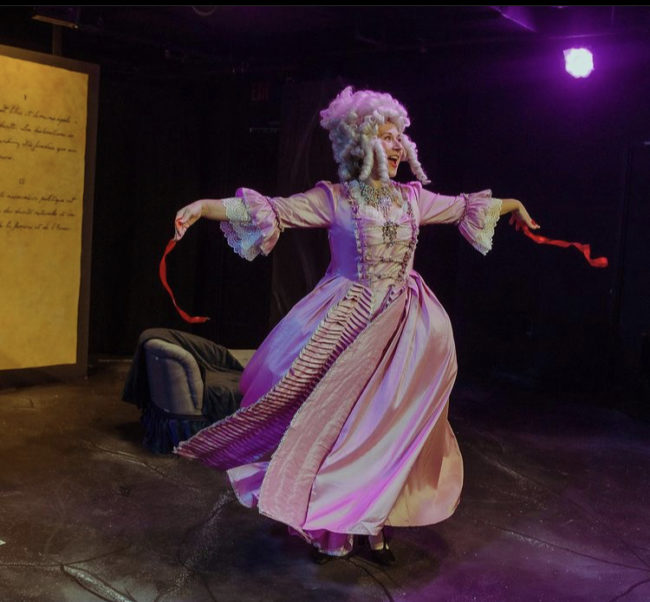Air and ink and make-believe. Isn’t that all theatre is when it comes down to it? But theatre isn’t flourish; it’s fundamental! Or so says the text of Lauren Gunderson’s The Revolutionists now on the main stage of the Maryland Ensemble Theatre. Directed by Gené Fouché, this meta-play within a meta-play of a play is a fundamental exploration of liberté, egalité, and sororité! Deep layers of freedom, equality, and sisterhood enveloped in the flavor of The French Revolution is what’s coming to the stage and it gets a little confusing, a little funny, and a little dark all at once.

Scenic and Property Design Team Alec Breck, Tad Janes, and Melynda Burdette Wintrol keep the setting of the show simple. (It’s an honest and defendable choice given the complexity of Gunderson’s script; the layers of confusion and chaotic happenings inside the text are quite enough to be getting on with and letting simplicity reign in the larger design elements serves this production well.) Breck, Janes, and Wintrol put the tenants of the ‘French Women’s declaration of Freedom’ up on the support columns, add sparse furnishings and leave the rest to the imagination. Lighting Designer Doug Grove follows suit, particularly when it comes to the guillotine, which is a major character all its own in Gunderson’s work. A simple diagonal cut block of light projected onto one of the columns, accompanied by Sound Designer Kaydin Hamby’s slick slicing sound effect and— voila! Madame Guillotine. Hamby’s work is somewhat lacking, however, throughout the production. Subtle rather than overstated and this leaves great gaps in places where even just a hint of background sound or music could have enhanced the performance.
While the play blurs lines of historical fiction and fantasy, modern and timeless issues, and a whole mess of other things, Costume Designer Rachel Smith stays true (adjacent) to the late 1790’s with the show’s sartorial selections. Miles and miles of shocking cotton candy pink for Marie Antoinette and a much more subtle, albeit floral-printed, dress for Olympe de Gouge. Smith crafts the couture for the Charlotte Corday character in an interesting light, giving her a bonnet and the layers of the period, insinuating an almost puritanical look to her. Smith does not stray away from the much-needed vibrant Caribbean island colors featured on the Marianne Angelle character, giving the audience the clear impression that she wholly embraces her heritage and her country.
The production is somewhat convoluted, largely because of the structure of Lauren Gunderson’s script. It’s not a rom-com (despite the pithy remarks in the play of “but if it’s not a rom-com, no one will see it!”), and it’s not a deep, dark tragedy either. Gunderson’s work is an enigmatic and ethereal froth bubble that hasn’t quite decided what it’s trying to be, what it needs to say, or how it wants to be perceived. This creates some challenges for director Gené Fouché. One of the things Fouché does brilliantly is the approach to Marie Antoinette. Historically, the French Monarch was a larger than life character and Fouché embraces this notion literally (could have even taken it farther in a more exaggerated fashion, in my opinion) and has Marie Antoinette taking up all the space. A tall actor in enormous heels, with panniers extending on either side underneath her poufy dress skirts, and an enormous wig all compliment the larger-than-life personality in a fascinating way.

The pacing at times feels off and there aren’t a great many instances where this happens, just sporadically throughout. The decision to have the lighting be more inclusive of the audience does not, in my opinion, accomplish the goal it set out to achieve of having the audience be ‘immersed’ into this world of play-within-meta-reality (because by the show’s conclusion there is a striking moment of fourth-wall-obliteration and if this lighting effect had been used for solely that moment it would have read cleaner and stronger.) The characters, at times, are portrayed with a more static existence— this is true mostly for Olympe de Gouge (Lisa Burl) and Charlotte Corday (Mikayla Domingo.) Whether or not this is an intentional choice by Fouché to create a juxtaposition of flat, real-life characters (de Gouge & Corday) against the dynamic and larger-than-life Marianne Angelle (who is not a real-life historical character but more a composite of historical figures) and Marie Antoinette is unclear. If it is an intentional choice, the balancing is off, if it is unintentional the flat character portrayals are lost in the mighty shadows of the more dynamic portrayals.
Lisa Burl attempts to find the heart not the art of the Olympe de Gouge character. At times this leaves the audience uncertain of what exactly this character is meant to be, which in a sense is accurate given the nature of Lauren Gunderson’s words. Burl is the outlier among the cast of four, sounding modern in her delivery throughout the entirety of the play. While the lines of all four characters dither in and out of modernity and French 1790’s, Burl’s delivery is the one that stays in present times, which in itself isn’t offensive or even a bad choice, but it does create a strange divide between her and the other three performers. If this directorial choice is intentional to make the ‘reveal’ of the ending ring true to the Olympe de Gouge character, it doesn’t go far enough. Burl does find moments of deep interconnectivity with the character, particularly towards the end of the production, showcasing her emotional depth in a way that might otherwise not be seen with this character.
Mikayla Domingo, as the fiery Charlotte Corday, at times is very shrieky, making it difficult to understand what exactly she’s saying as the articulation of Gunderson’s words get lost in her enthusiastic emotional outbursts. The generalized sense of high-octane emotions are present and get enough of the message across that the lost dialogue doesn’t distract from the progressive motion of the plot. Domingo arrives with level ten energy and never waivers but choice also doesn’t give her anywhere to rise to when it comes to incredibly striking moments like the scene in the prison after her arrest. (Again the simplicity of the SDP-Team and Lighting Designer for letting this moment mostly do its thing without cumbersome excess on the stage.)
Rachel Manu is a force to be reckoned with when it comes to her portrayal of the historical-fiction composite character of Marianne Angelle. There is a pressing, urgent desperation in all of her movements and textual deliveries, which never wavers from her core but does get dialed up and down depending on the severity of the scene. From the moment she barnstorms Olympe de Gouge’s place, demanding pamphlets for equality through to the way her narration carries out the show’s conclusion, you feel this unyielding sense of determination radiating out from Manu in tidal waves. Manu has extraordinary facial expressions, particularly when it comes to casting withering looks of disbelief when Olympe de Gouge is whining or when Marie Antoinette is being— well— Marie.

A radiant sparkle both bigger and brighter than the getup the character wears, Jennifer Pagano is a smashing success in the role of Marie Antoinette. The way Gunderson has penned the character makes you want to dislike her, or at the very least roll your eyes in her general direction right alongside Marianne Angelle, but Pagano is so outrageous and truly living her larger-than-life-best-life that all you can do is laugh, and not just laugh but laugh deeply and warmly from the depths of your funny bone. Pagano is not without her versatility, however, as she demonstrates towards the character’s narrative end, giving a solemn and sobering outcry the scene before she meets Madame Guillotine. (History is NOT a spoiler.) There are beautiful moments of bonding between Pagano’s Marie and Manu’s Marianne, at first they’re more like anti-bonding moments when Manu’s character goes on the bombastic attack, but later there are true moments of comfort, tenderness, and sororité that showcase both of these talented performers’ acting skillsets. Pagano’s Marie Antoinette is a must-see; it provides a level of much needed hilarity in this curious meandering script that Lauren Gunderson has penned.
Revolution for all is what’s happening on the Maryland Ensemble main stage this fall. Lauren Gunderson’s The Revolutionists is a unique experience to be sure and well worth investigating; come prepared for the curious confusion and delightful laughing moments as well as the heavy reality that the rights of women haven’t really changed all that much since 1790.
Running Time: Approximately 2 hours and 20 minutes with one intermission
The Revolutionists plays through October 17, 2021 on the Main Stage of the Maryland Ensemble Theatre in the Historic FSK Hotel building— 31 W. Patrick street in downtown historic Frederick, MD. For tickets call the box office at (301) 694-4744 or purchase them online.
